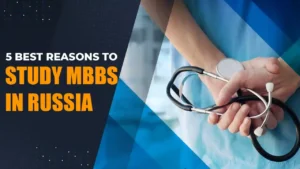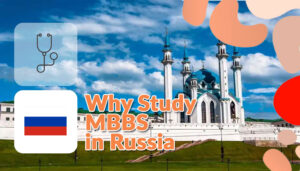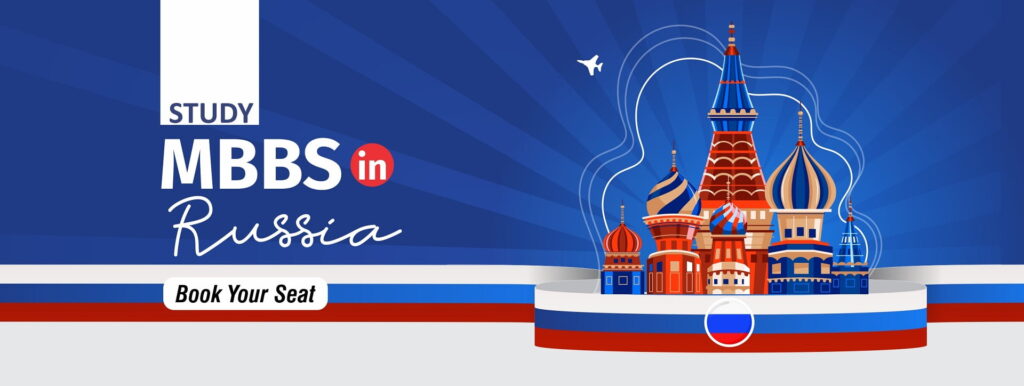MBBS in Russia
 Program Structure for MBBS
Program Structure for MBBS
Length: In Russia, an MBBS program often lasts six years. This comprises:
Fundamental Medical Sciences: Basic medical sciences including anatomy, physiology, biochemistry, and pathology are the main focus of the first two to three years of study.
Clinical Training: Rotations through different medical specialties are part of the hands-on clinical training that takes place in hospitals and clinics throughout the latter years. (MBBS in Russia)
Instructional Language
English-Medium Programs: To accommodate overseas students, numerous universities provide MBBS programs in English. International standards are met in the creation of these programs.
Russian Language: Learning the basics of the language will help you communicate with patients and comprehend the local healthcare system, even if the curriculum is taught in English.
Qualifications for Entrance
(how can apply in mbbs in russia)
High School Diploma: Students must have earned excellent grades throughout their high school career, especially in biology, chemistry, and physics.
Entrance examinations: While many colleges accept students based on their academic performance and pertinent documentation, some may need entrance examinations or interviews.
Health Check: To make sure that students are suitable for medical training, a health check is frequently necessary.
Top Medical Universities
Russia has several well-regarded medical universities, including:
- Lomonosov Moscow State University
- Saint Petersburg State Medical University
- Moscow Medical Academy
- Kazan Federal University
- Novosibirsk State University
- Smolensk State Medical University

Tuition Cost
(mbbs in russia fees structure)
Depending on the university and the language of instruction, tuition for MBBS programs in Russia normally ranges from USD 3,000 to USD 8,000 annually.
cost of mbbs in russia
Cost of Living: Compared to many Western nations, Russia has a comparatively low cost of living. A student’s annual budget for housing, food, transportation, and personal expenses should range from USD 2,000 to USD 5,000.
Related Topics:
Financial Aid & Scholarships
International students can apply for a number of scholarships, including those provided by the Russian government, academic institutions, and private businesses. These could pay for living expenses, school, or both.
Financial help: Although there aren’t many alternatives for financial help, some colleges or other funding sources may be able to provide it.
Clinical Education and Resources
Modern Facilities: With their connections to major hospitals and array of contemporary amenities, several Russian medical institutes offer top-notch clinical education to their students.
Hospital Internships: As part of clinical training, students often participate in internships and rotations in hospitals, where they receive hands-on training in a range of medical specialties.
Post-Graduation Pathways Medical Licensing
To practice medicine in Russia, graduates must pass the Russian Medical Licensing Examination. It could be necessary to pass additional license examinations and meet additional requirements in order for someone to practice abroad.
Additional Training: Graduates may choose to return home for additional training or seek residency and specialization in Russia.
Obstacles
Variation in level: It’s crucial to do your homework and pick a reliable university because there can be differences in the level of education offered by different ones.
Language Barrier: Fluency in Russian is necessary for programs that are not taught in English. Learning the basics of Russian can be beneficial for communicating with patients and comprehending the local healthcare system, even for programs taught in English.
Acknowledgment and Licensing: Graduates may encounter difficulties getting their degrees acknowledged abroad and getting medical licenses. Finding out what is required to practice medicine in your home country and other desired countries is crucial.
 Career Possibilities
Career Possibilities
(mbbs in russia duration)
Russia: Medical graduates can find employment in Russian clinics, hospitals, or research facilities. Healthcare workers are in greater demand than ever, especially in specialist industries and metropolitan locations.
International: Although many nations recognize an MBBS from Russia, graduates may also need to fulfill local licensing criteria and pass additional tests in order to practice medicine abroad.

